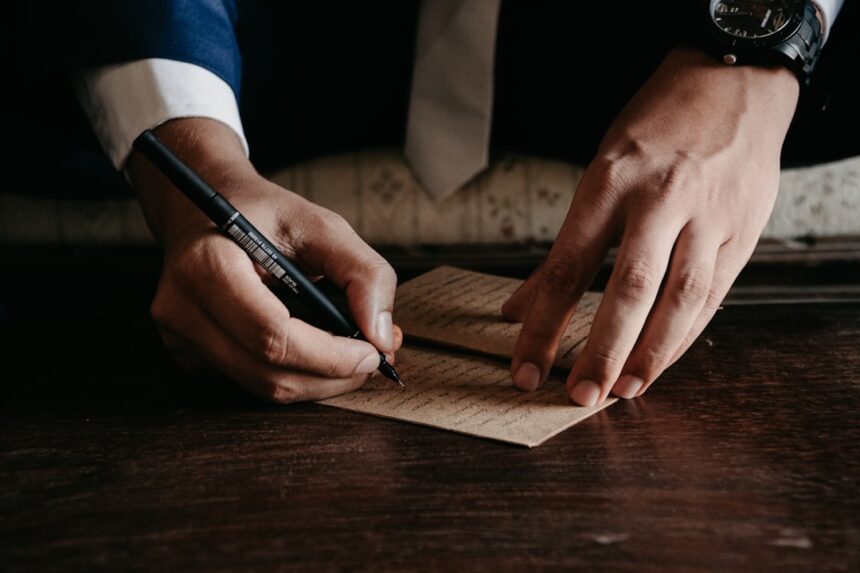House deed signature fraud is a serious issue that can have devastating consequences for property owners. At its core, this type of fraud involves the unauthorized signing of a house deed, which can lead to the transfer of property ownership without the consent of the rightful owner. I find it alarming how easily someone can manipulate documents to claim ownership of a property that does not belong to them.
This fraudulent act can occur in various ways, including forgery, identity theft, or even the use of fake identification to deceive notaries and other officials. As I delve deeper into this topic, I realize that understanding the nuances of house deed signature fraud is crucial for anyone involved in real estate transactions. The implications of such fraud extend beyond mere financial loss; they can also lead to emotional distress and a protracted legal battle to reclaim one’s property.
I have come to appreciate the importance of vigilance and due diligence when it comes to property transactions, as the consequences of falling victim to this type of fraud can be life-altering.
Key Takeaways
- House deed signature fraud can have a significant impact on property ownership and financial security.
- House deed signature fraud occurs when someone forges or falsifies a signature on a property deed without the owner’s consent.
- Potential signs of house deed signature fraud include sudden changes in property ownership, unauthorized property transfers, and suspicious notary practices.
- Notaries play a crucial role in preventing house deed signature fraud by verifying the identity of signers and ensuring the authenticity of signatures.
- Victims of house deed signature fraud may seek legal recourse through civil litigation to reclaim ownership of their property and hold the perpetrators accountable.
The Impact of House Deed Signature Fraud
The impact of house deed signature fraud can be profound and far-reaching. For victims like myself, the immediate consequence is often financial loss. Losing a home or investment property due to fraudulent activity can lead to significant monetary repercussions, including legal fees, lost equity, and potential foreclosure.
I have seen firsthand how such losses can destabilize families and disrupt lives, leading to emotional turmoil and uncertainty about the future. Moreover, the ripple effects of house deed signature fraud extend beyond the individual victim. Communities can suffer when property ownership becomes uncertain or contested.
Neighborhood stability can be compromised as disputes arise over rightful ownership, leading to a decline in property values and an increase in crime rates. I have come to understand that this type of fraud not only affects individuals but also has broader implications for the real estate market and community cohesion.
How House Deed Signature Fraud Occurs

House deed signature fraud can occur through various methods, each exploiting vulnerabilities in the property transfer process. One common way is through forgery, where a fraudster replicates the signature of the rightful owner on a deed. I find it unsettling how skilled some individuals can be at mimicking handwriting, making it difficult for even trained professionals to detect the deception.
This method often involves obtaining personal information about the victim, which can be done through identity theft or social engineering tactics. Another way this fraud occurs is through the use of fake identification or documents. In some cases, perpetrators may create entirely fictitious identities to present themselves as legitimate buyers or sellers.
I have learned that this type of fraud often targets vulnerable individuals, such as elderly homeowners or those who may not be familiar with the intricacies of real estate transactions. The ease with which these fraudulent activities can take place highlights the need for increased awareness and protective measures within the real estate industry.
Signs of Potential House Deed Signature Fraud
| Signs of Potential House Deed Signature Fraud |
|---|
| 1. Unusual variations in the signature |
| 2. Lack of consistency in the signature |
| 3. Different handwriting styles within the document |
| 4. Signatures that do not match the individual’s known signature |
| 5. Missing or incomplete signatures |
| 6. Signatures that appear to be traced or copied |
Recognizing the signs of potential house deed signature fraud is essential for safeguarding one’s property. One red flag that I have learned to watch for is any sudden or unexpected changes in property ownership records. If I notice that my name has been removed from a deed or that a new owner has appeared without my knowledge, it raises immediate concerns.
Additionally, I have come to understand that unusual activity around my property—such as strangers visiting frequently or attempts to contact me regarding my home—can also indicate fraudulent intentions. Another sign to be aware of is discrepancies in documentation. If I receive communication regarding my property that contains errors or inconsistencies—such as misspelled names, incorrect addresses, or unusual signatures—it is crucial to investigate further.
These discrepancies can serve as warning signs that something is amiss and may warrant a closer examination of my property records. By staying vigilant and informed about these potential indicators, I can better protect myself from becoming a victim of house deed signature fraud.
The Role of Notaries in Preventing House Deed Signature Fraud
Notaries play a vital role in preventing house deed signature fraud by serving as impartial witnesses to the signing of important documents. Their primary responsibility is to verify the identities of individuals involved in a transaction and ensure that they are signing willingly and without coercion. I have come to appreciate the importance of working with reputable notaries who adhere to strict ethical standards and follow established protocols for verifying identities.
In addition to verifying identities, notaries are also responsible for ensuring that all documents are properly executed and compliant with legal requirements. This includes checking for proper signatures, dates, and any necessary witnesses. I have learned that a diligent notary can act as a first line of defense against fraudulent activities by identifying potential red flags during the signing process.
By choosing a qualified notary who takes their responsibilities seriously, I can significantly reduce the risk of falling victim to house deed signature fraud.
Legal Recourse for Victims of House Deed Signature Fraud

For victims of house deed signature fraud, understanding legal recourse options is essential for reclaiming their rights and property. One avenue available is filing a lawsuit against the perpetrator for damages incurred as a result of the fraud. I have learned that this process can be complex and may require substantial evidence to prove wrongdoing.
Gathering documentation, such as original deeds, correspondence with the fraudster, and any relevant witness statements, is crucial for building a strong case. Additionally, victims may also consider reporting the fraud to law enforcement agencies or local authorities. In some cases, criminal charges may be brought against those responsible for the fraudulent activity.
I find it empowering to know that there are legal mechanisms in place designed to protect victims and hold perpetrators accountable for their actions. However, navigating the legal landscape can be daunting, which is why seeking guidance from an experienced attorney specializing in real estate law is often advisable.
Steps to Take to Protect Against House Deed Signature Fraud
Taking proactive steps to protect against house deed signature fraud is essential for any property owner. One of the first measures I have learned is to regularly monitor my property records with local government offices or online databases. By keeping an eye on any changes or updates to my deed, I can quickly identify any unauthorized activity and take action if necessary.
Another important step is safeguarding personal information. I have come to understand that many fraudsters rely on stolen identities to commit their crimes. Therefore, being cautious about sharing sensitive information—such as Social Security numbers or financial details—is crucial.
Utilizing secure methods for storing documents and being vigilant about phishing scams can help protect against identity theft and subsequent fraudulent activities related to house deeds.
Real-Life Examples of House Deed Signature Fraud
Real-life examples of house deed signature fraud serve as stark reminders of how easily individuals can fall victim to such schemes. One case that stands out involved an elderly couple who discovered that their home had been sold without their knowledge. A con artist had forged their signatures on a deed and presented it to a title company, successfully transferring ownership to an unsuspecting buyer.
The couple faced a lengthy legal battle to reclaim their home, highlighting the emotional toll such fraud can take on victims. Another example involved a young professional who was targeted by identity thieves who used her personal information to create fake documents claiming she had sold her property. When she received notices from her mortgage lender about missed payments on a home she believed she still owned, she was shocked to learn that her identity had been compromised.
This case illustrates how vulnerable individuals can be when their personal information falls into the wrong hands and emphasizes the need for vigilance in protecting one’s identity.
The Importance of Verifying House Deed Signatures
Verifying house deed signatures is a critical step in ensuring the legitimacy of property transactions. As I have learned, even minor discrepancies in signatures can raise significant concerns about authenticity and intent. It is essential for all parties involved in a transaction—buyers, sellers, and notaries—to take this verification process seriously.
By carefully examining signatures against known samples and ensuring proper documentation is in place, I can help safeguard against potential fraud. Moreover, I have come to appreciate that verification extends beyond just signatures; it also involves confirming identities and ensuring that all parties are acting willingly and without coercion. This comprehensive approach helps create a more secure environment for real estate transactions and reduces the likelihood of fraudulent activities occurring.
The Consequences of Committing House Deed Signature Fraud
The consequences of committing house deed signature fraud are severe and far-reaching for those who engage in such illegal activities. Individuals found guilty of this type of fraud may face criminal charges ranging from misdemeanors to felonies, depending on the severity of their actions and the impact on victims. I find it sobering to consider how quickly someone’s life can change when they make choices driven by greed or desperation.
In addition to criminal penalties, perpetrators may also face civil lawsuits from victims seeking restitution for their losses. This dual threat underscores the seriousness with which society views house deed signature fraud and serves as a deterrent for those considering engaging in such behavior. Ultimately, I believe that understanding these consequences is essential for fostering a culture of integrity within real estate transactions.
Resources for Victims of House Deed Signature Fraud
For victims of house deed signature fraud, accessing resources and support is crucial for navigating the aftermath of such experiences. Organizations dedicated to consumer protection often provide valuable information on how to report fraud and seek legal assistance.
Sharing experiences and advice can be empowering and provide much-needed emotional support during difficult times. By leveraging these resources, I believe victims can take proactive steps toward reclaiming their rights and finding resolution after experiencing house deed signature fraud.
In conclusion, understanding house deed signature fraud is essential for anyone involved in real estate transactions. By recognizing its impact, learning how it occurs, identifying signs of potential fraud, and knowing how to protect oneself, I feel more empowered in my own property dealings. The role of notaries cannot be overstated in preventing such frauds; they serve as guardians against deception in these critical transactions.
Ultimately, by staying informed and vigilant, we can work together to combat house deed signature fraud and protect our homes and investments from those who seek to exploit them.
In recent years, house deed signature fraud has become an increasingly concerning issue, with many homeowners falling victim to this deceitful practice. A related article that delves into the intricacies of property fraud and offers insights into how individuals can protect themselves is available on the website “Am I Wrong Here.” This article provides valuable information on the warning signs of deed fraud and the steps one can take to safeguard their property. For more details, you can read the full article by visiting this link.
✅WATCH NOW! My Mother-in-Law’s Real Estate Heist Collapses Spectacularly
FAQs
What is house deed signature fraud?
House deed signature fraud occurs when someone forges a signature on a house deed in order to fraudulently transfer ownership of the property.
What are the consequences of house deed signature fraud?
The consequences of house deed signature fraud can be severe, including the loss of property ownership, financial losses, and legal disputes.
How can house deed signature fraud be prevented?
To prevent house deed signature fraud, it is important to safeguard important documents, verify the identity of all parties involved in property transactions, and seek legal advice when in doubt.
What should I do if I suspect house deed signature fraud?
If you suspect house deed signature fraud, you should immediately contact the authorities and seek legal assistance to protect your rights and property ownership.
What legal actions can be taken against perpetrators of house deed signature fraud?
Perpetrators of house deed signature fraud can face criminal charges and civil lawsuits for their actions, and may be required to compensate the victim for any losses incurred.




